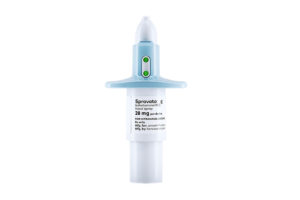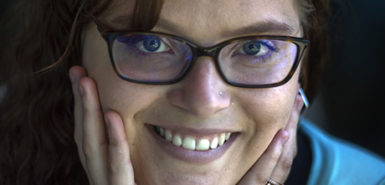
For the first time in decades, doctors have a new weapon to fight serious cases of depression.
Of the 16 million Americans adults living with depression, as many as four million have treatment-resistant depression, which means current treatments such as talk therapy, anti-depressants and electro-convulsive therapy have given them little or no relief.
But on Tuesday, the Food and Drug Administration approved ketamine, a fast-acting drug that differs significantly from Prozac, Paxil and other anti-depressants that have been on the market since the 1990s.
Even when antidepressants work, it often takes four to six weeks to kick in, while ketamine only takes several hours to begin showing positive effects, drug trials have shown. The approval is “welcomed news,” said David Franzblau, MD, a psychiatrist with Spectrum Health Medical Group.
“The prospects for ketamine as a long-term treatment remains to be seen,” said Dr. Franzblau, the site chief of the Spectrum Health Integrated Care Campus at East Beltline.
“Trials have shown that the duration of time before symptom-relief is generally much shorter compared to current antidepressants so it at least represents a promising bridge, if not a long-term treatment.”
A stubborn illness
Depression is a mood disorder that affects the way people feel and interferes with their ability to function at home and at work.
It can be associated with the loss of appetite, sleep disturbance, difficulty concentrating, memory impairment, and a loss of motivation and productivity, Dr. Franzblau said.
“Everybody experiences sadness and anxiety,” he said. “It’s the length of time and number of episodes, along with a constellation of other symptoms, that determine whether somebody has clinical depression.”
About one in 16 American adults suffer from clinical depression at any given moment.
“Depression is the most prevalent mental health disorder in the population,” Dr. Franzblau said. “I believe the adverse impacts of even the treatment-resistant variants can be substantially decreased, and thereby improve the quality of life (of all patients), with enough time and a systematic approach.”
The first step in combating depression is consulting with your primary care physician. First-line interventions that a mental health professional might recommend include counseling and medication.
Antidepressants regulate neurotransmitters like dopamine, serotonin and norepinephrine. But the results have been mixed, especially for the up to 33 percent of patients who have treatment-resistant depression.
One current intervention for treatment-resistant depression is electro-convulsive therapy. The benefits of electro-convulsive therapy “were observed accidentally,” Dr. Franzblau said, “like many scientific discoveries.”
The symptoms of depression among patients with epilepsy improved after a seizure.
“The brain is an electrical apparatus: brain activity, thinking, memory and mood regulation like arousal or anxiety, those are all electrical or electro-chemical events,” he said. “So ECT is basically inducing a seizure” in a controlled environment (often in an outpatient setting), helping severely depressed people who haven’t responded to medication.
There are misconceptions about the procedure, and suitable patients have to be chosen, but it can be effective in bringing about a recovery, Dr. Franzblau said. Sometimes one course of this treatment will suffice, or a patient may require periodic maintenance treatment.
From the club to the doctor’s office
Despite $12 billion a year spent on antidepressants globally, suicide rates have increased 25 percent nationally in the last two decades, and are rising in 49 of 50 states.
That’s why any new treatment is welcomed news.
Interest in ketamine—an anesthetic used frequently in hospitals and the battlefield—has grown steadily since the early 2000s.
In 2000, researches at Yale reported that doses of ketamine provided quick relief to seven people with depression.
In 2006, the National Institute of Mental Health documented 18 people with treatment-resistant depression who received the drug intravenously and reported their issues had disappeared almost immediately.
“What seems remarkable is that the drug also seems to help domains other than depression, like anxiety, suicidal thinking, and anhedonia”—the inability to feel pleasure, noted Dr. Carlos Zarate Jr, chief of the National Institute of Mental Health’s experimental therapeutics branch who led the 2006 study.
“It seems to have more broad effects, on many areas of mood,” shared in a New York Times article about ketamine.
Ketamine does have side effects. Ketamine was once a popular drug in the 1980s and 1990s known as Special K, and can cause hallucinations and psychotic episodes in people who are high risk for them. The drug also was less effective in drug trials for people over 65.
The drug maker, Janssen Pharmaceuticals, said the non-generic medication form esketamine, which will be marketed as Spravato, would have less dramatic side effects. Like with all new drugs, Dr. Franzblau said he’ll proceed cautiously because the benefits and costs become clear only after a medication has been used for some time.
“I anticipate I will use it,” he said. “I want to make sure that the benefits outweigh any complications and side effects.”
Esketamine will be administered as a nasal spray. Patients who receive it will have to be monitored for at least two hours, and won’t be allowed to drive on days they receive the drug.
The recommended course will be two days per week for four weeks.
In one drug trial, Janssen reported that those taking esketamine only relapsed into depression 25 percent of the time, as opposed to 45 percent with a placebo. All the people in the study had previously been diagnosed as having treatment-resistant depression, and had failed with other types of treatment.
“Clinical depression represents considerable suffering for the patient and their families,” Dr. Franzblau said. “At worse, it’s a lethal condition, as demonstrated by the rising suicides in our country. New treatments are needed and offer hope.”
 /a>
/a>
 /a>
/a>
 /a>
/a>